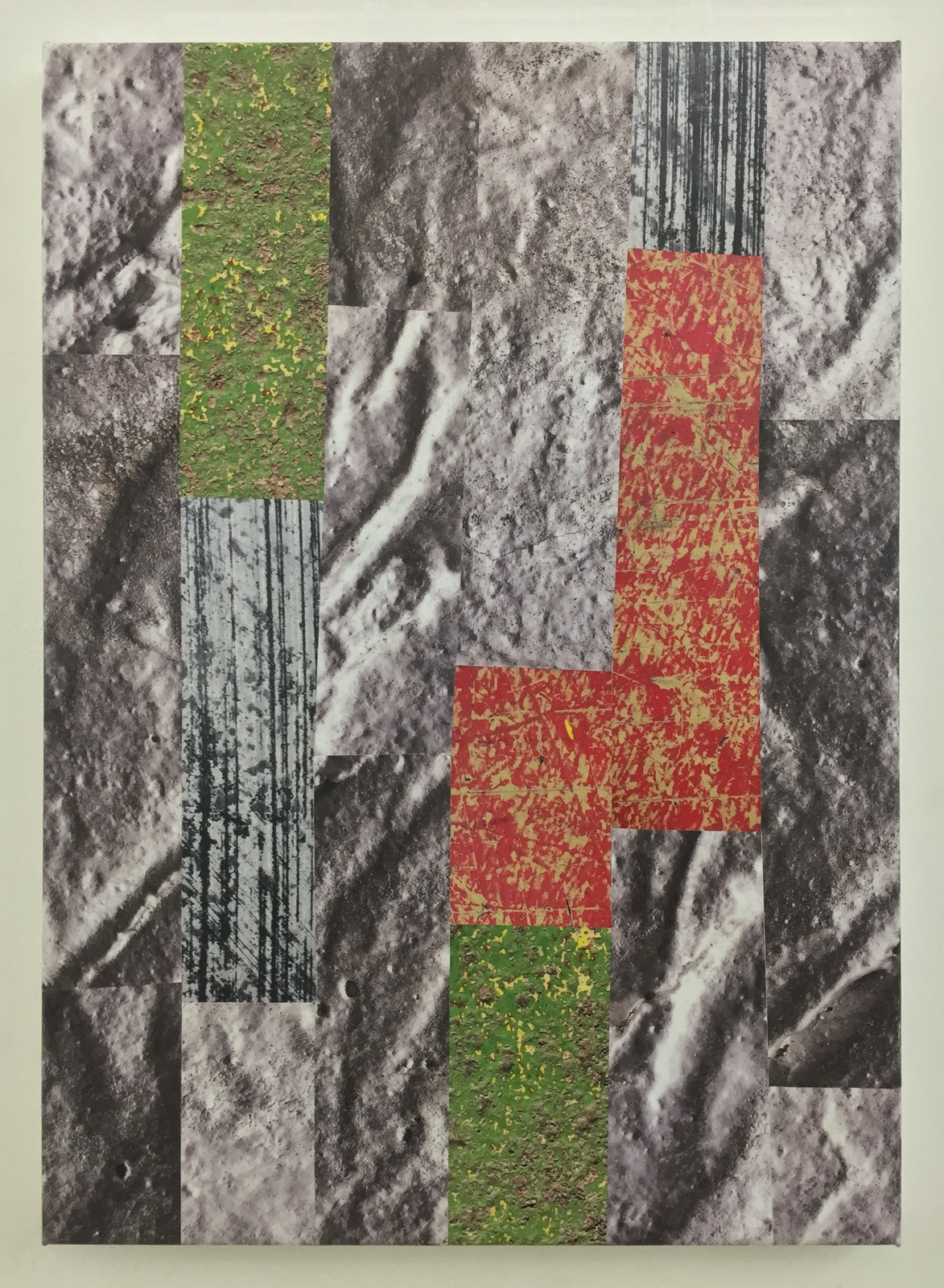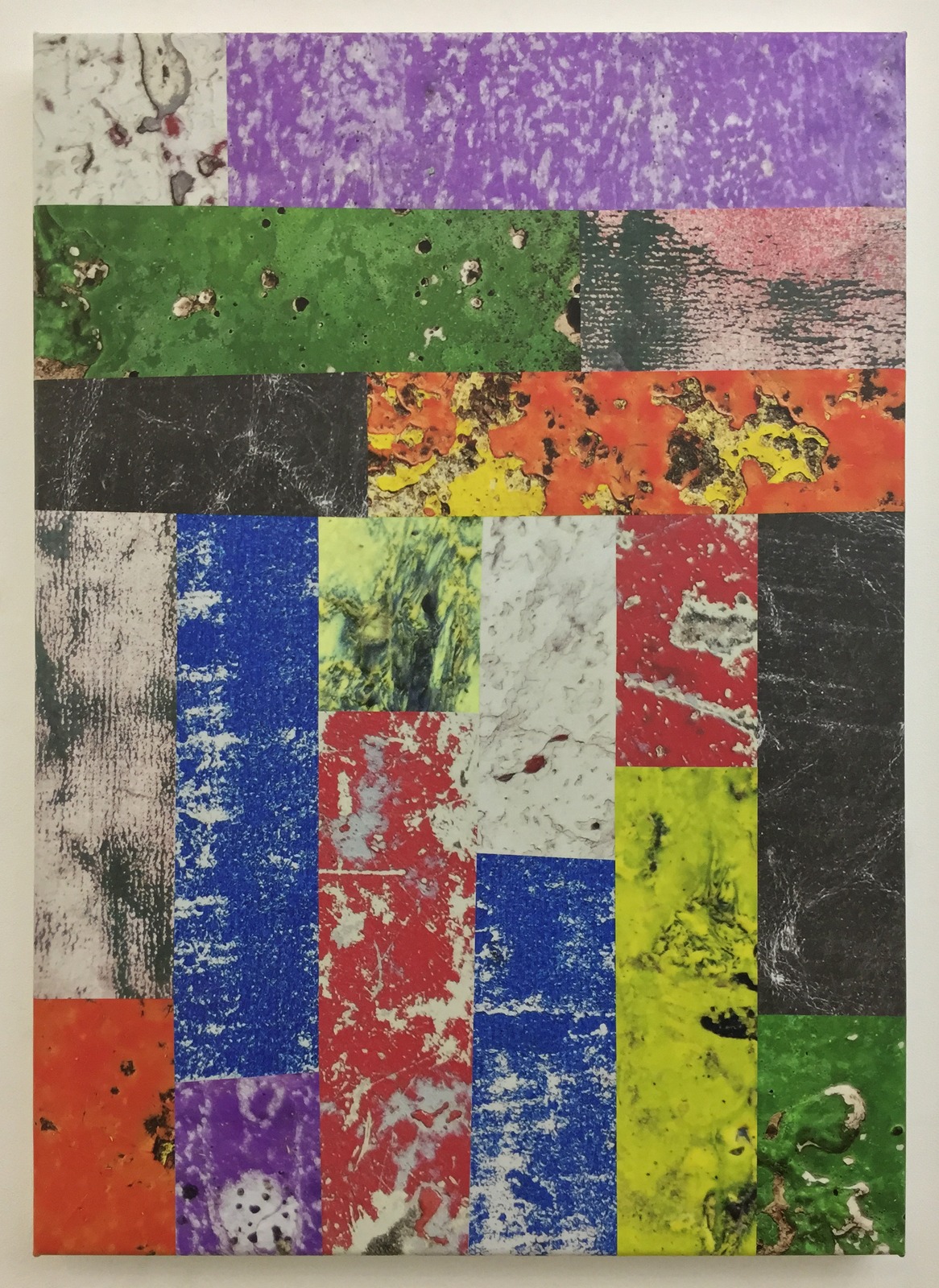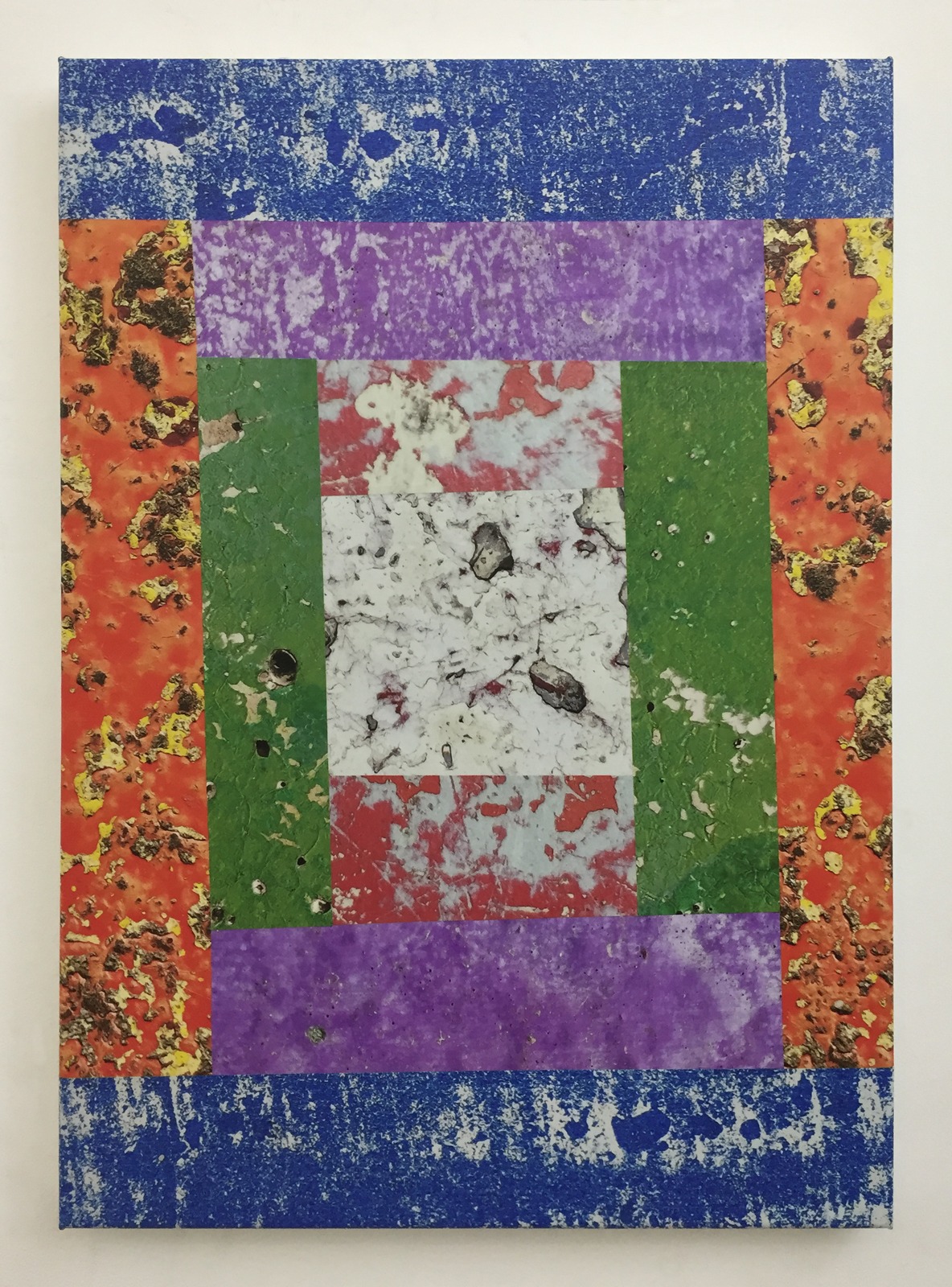Louis Cameron
19 Feb - 16 Apr 2022
Gallery Michael Janssen is pleased to announce the first solo exhibition of Louis Cameron with the gallery. The self-titled exhibition will present the most recent works from the series „Collage paintings“ and „Last words“. The exhibition will open on Friday, February 18th and be on view until April 16th. In the interview with Dr.Tiffany E. Barber, the artist explains more about the upcoming show.
Dr. Tiffany E. Barber – Your art practice spans a range of media—painting, printmaking, photography, sculpture, assemblage, video, and poster art—and you‘ve spent the bulk of your career making abstract, conceptually driven objects. In the U.S., you are well known for hard-edge abstract paintings and video work that appropriate colors and commodities that circulate in the public sphere, namely Heineken beer, Tide laundry detergent, and Hershey chocolate bars. More recently, your work has turned to issues of surveillance and digital activism. How has your work changed over the years and in relation to place and location?
Louis Cameron – I was in New York City during 9/11. Like most people in the city at the time I deeply questioned aspects of my life and art. Subsequently, I reaffirmed my commitment to abstraction, an abstraction that engaged the world. When I was an Artist-in-Residence at The Studio Museum in Harlem—2002-2003—this engagement came in the form of an exploration of color I found in my immediate environment—mostly from products in my studio and apartment. Later I worked with color that had cultural significance, as in The African American Flag Project. Now I’m working with color I find on my walks through Berlin.
Dr. Tiffany E. Barber – This exhibition, your first at Galerie Michael Janssen, builds on concerns you‘ve been investigating throughout your twenty-two-year career regarding color, surface, text, and the activation of public and private space, whether physical or online. What ideas are you exploring in this new body of work?
Louis Cameron – In this exhibition, I am presenting two bodies of work. The first is the Collage Paintings, works in which I collage posters with images of color and textures I have taken from around Berlin on canvas in patchwork patterns based on African American quilts—exemplified by the quilters of Gee’s Bend. These works are an exploration of color and place.I am also presenting a couple of works from the Last Words series. Each work is a sequence of vinyl posters—each presenting a letter—that spell out quotes from African Americans that have been killed due to the police or vigilante violence. These works are about mourning, remembrance, and expressions of humanity.
Dr. Tiffany E. Barber – As an African American artist born and raised in the United States and now living in Berlin, does identity play a role in your work at all?
Louis Cameron – I would say it does in the sense that I feel how American/African American I am living outside the United States. This awareness is present in the Last Words works. However, I am more interested in African American culture with the Collage Paintings.
Dr. Tiffany E. Barber – In aim, these two bodies of work relate to your online initiative The Poster Project presents, where you invite yourself and others to explore and devise an art that is politically and socially engaged. The 2020 Black Lives Matter uprisings and the COVID-19 pandemic have intensified conversations concerning anti-Black violence, global wellbeing, the limits and possibilities of protest, and how we relate to one another. With Last Words, you directly address the political and cultural landscape of today by crafting a site-responsive memorial for Black lives lost to police and vigilante brutality. How have these events affected your approach to your work?
Louis Cameron – Witnessing these recent events—especially from afar—has been traumatizing, to the point that I needed to create the Last Words series to mourn and memorialize the lives that have been lost. While the visuals of the violence enacted on these individuals are burned into our collective memory, I found their words compelling.
Dr. Tiffany E. Barber – Let’s talk more about the work’s formal and aesthetic innovations. Like Last Words, your other series, Collage Paintings, also incorporates the poster form. They additionally filter the history of abstraction and American modernism through an African American aesthetic that stems from collage and quilting, a cultural specificity you shied away from early in your career. How are you modulating form and history in these works, and what do you hope viewers take away from their encounters with this show?
Louis Cameron – With the Collage Paintings series, I am putting the authentic African American visual expression of improvised quilts—developed by Black women in parallel to American Modernism—into conversation with painting. So I hope the viewer comes away from these works with a heightened sensitivity to the colors and textures of Berlin, and the enrichment that yields. Last Words functions similarly in terms of how I’m critiquing and expanding the tradition of conceptual text-based art. I am infusing this form with a uniquely Black voice and cultural perspective, and my main concern with this body of work is the creation or reinforcement of empathy.
Dr. Tiffany E. Barber is an internationally recognized scholar, curator, and critic whose writing and expert commentary have appeared in top-tier academic journals, popular media outlets, and award-winning documentaries. Her work, which spans abstraction, dance, fashion, feminism, and the ethics of representation, focuses on artists of the Black diaspora working in the United States and the broader Atlantic world. Her latest curatorial project, a virtual, multimedia exhibition for Google Arts and Culture, examines the value of Afrofuturism in times of crisis.
Dr. Barber is Assistant Professor of Africana Studies and Art History at the University of Delaware as well as curator-in-residence at the Delaware Contemporary. She has completed fellowships at ArtTable, the Delaware Art Museum, and the University of Virginia’s Carter G. Woodson Institute for African-American and African Studies. During the 2021-2022 academic year, Dr. Barber is a Postdoctoral Fellow at the Getty Research Institute where she is completing her first book.
Dr. Tiffany E. Barber – Your art practice spans a range of media—painting, printmaking, photography, sculpture, assemblage, video, and poster art—and you‘ve spent the bulk of your career making abstract, conceptually driven objects. In the U.S., you are well known for hard-edge abstract paintings and video work that appropriate colors and commodities that circulate in the public sphere, namely Heineken beer, Tide laundry detergent, and Hershey chocolate bars. More recently, your work has turned to issues of surveillance and digital activism. How has your work changed over the years and in relation to place and location?
Louis Cameron – I was in New York City during 9/11. Like most people in the city at the time I deeply questioned aspects of my life and art. Subsequently, I reaffirmed my commitment to abstraction, an abstraction that engaged the world. When I was an Artist-in-Residence at The Studio Museum in Harlem—2002-2003—this engagement came in the form of an exploration of color I found in my immediate environment—mostly from products in my studio and apartment. Later I worked with color that had cultural significance, as in The African American Flag Project. Now I’m working with color I find on my walks through Berlin.
Dr. Tiffany E. Barber – This exhibition, your first at Galerie Michael Janssen, builds on concerns you‘ve been investigating throughout your twenty-two-year career regarding color, surface, text, and the activation of public and private space, whether physical or online. What ideas are you exploring in this new body of work?
Louis Cameron – In this exhibition, I am presenting two bodies of work. The first is the Collage Paintings, works in which I collage posters with images of color and textures I have taken from around Berlin on canvas in patchwork patterns based on African American quilts—exemplified by the quilters of Gee’s Bend. These works are an exploration of color and place.I am also presenting a couple of works from the Last Words series. Each work is a sequence of vinyl posters—each presenting a letter—that spell out quotes from African Americans that have been killed due to the police or vigilante violence. These works are about mourning, remembrance, and expressions of humanity.
Dr. Tiffany E. Barber – As an African American artist born and raised in the United States and now living in Berlin, does identity play a role in your work at all?
Louis Cameron – I would say it does in the sense that I feel how American/African American I am living outside the United States. This awareness is present in the Last Words works. However, I am more interested in African American culture with the Collage Paintings.
Dr. Tiffany E. Barber – In aim, these two bodies of work relate to your online initiative The Poster Project presents, where you invite yourself and others to explore and devise an art that is politically and socially engaged. The 2020 Black Lives Matter uprisings and the COVID-19 pandemic have intensified conversations concerning anti-Black violence, global wellbeing, the limits and possibilities of protest, and how we relate to one another. With Last Words, you directly address the political and cultural landscape of today by crafting a site-responsive memorial for Black lives lost to police and vigilante brutality. How have these events affected your approach to your work?
Louis Cameron – Witnessing these recent events—especially from afar—has been traumatizing, to the point that I needed to create the Last Words series to mourn and memorialize the lives that have been lost. While the visuals of the violence enacted on these individuals are burned into our collective memory, I found their words compelling.
Dr. Tiffany E. Barber – Let’s talk more about the work’s formal and aesthetic innovations. Like Last Words, your other series, Collage Paintings, also incorporates the poster form. They additionally filter the history of abstraction and American modernism through an African American aesthetic that stems from collage and quilting, a cultural specificity you shied away from early in your career. How are you modulating form and history in these works, and what do you hope viewers take away from their encounters with this show?
Louis Cameron – With the Collage Paintings series, I am putting the authentic African American visual expression of improvised quilts—developed by Black women in parallel to American Modernism—into conversation with painting. So I hope the viewer comes away from these works with a heightened sensitivity to the colors and textures of Berlin, and the enrichment that yields. Last Words functions similarly in terms of how I’m critiquing and expanding the tradition of conceptual text-based art. I am infusing this form with a uniquely Black voice and cultural perspective, and my main concern with this body of work is the creation or reinforcement of empathy.
Dr. Tiffany E. Barber is an internationally recognized scholar, curator, and critic whose writing and expert commentary have appeared in top-tier academic journals, popular media outlets, and award-winning documentaries. Her work, which spans abstraction, dance, fashion, feminism, and the ethics of representation, focuses on artists of the Black diaspora working in the United States and the broader Atlantic world. Her latest curatorial project, a virtual, multimedia exhibition for Google Arts and Culture, examines the value of Afrofuturism in times of crisis.
Dr. Barber is Assistant Professor of Africana Studies and Art History at the University of Delaware as well as curator-in-residence at the Delaware Contemporary. She has completed fellowships at ArtTable, the Delaware Art Museum, and the University of Virginia’s Carter G. Woodson Institute for African-American and African Studies. During the 2021-2022 academic year, Dr. Barber is a Postdoctoral Fellow at the Getty Research Institute where she is completing her first book.



